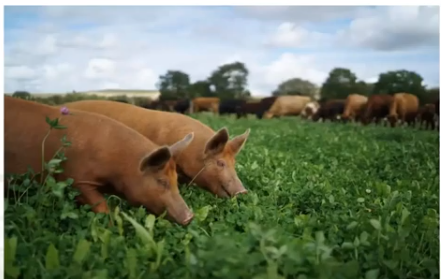Webinars prove popular with members
The PFLA’s webinar programme, created in response to lockdown and the inability for members to travel to events and farm tours, has provided fascinating and useful insights on a wide range of topics from leading experts and farmers, speaking from across the UK and beyond. Most of these are for PFLA members only, but some are open to all.
Environmental Land Management
The series kicked off with Jenny Phelps of FWAG South West and Adele Jones of the Sustainable Food Trust talking about the ELMS trials they are involved in – two of 50 or more being carried out by a myriad of organisations. These have been designed to help Defra draw up post-Brexit plans for farming and the new payment structures for the wide range of public goods farmers will provide as well as food.
Jenny talked about how a five-year UK Habitat Mapping project describes simply but in depth, how land is managed at farm, parish and wider landscape levels. This provides a platform that everyone can invest in, be it when looking for public benefits, the provision of local food supply chains, economic recovery post covid-19 or delivering a response to climate change – such as better resilience to flooding.
The Sustainable Food Trust is worried that the large number of ELMS trials are all working at different parts of the puzzle and feels the needs for some joined-up thinking. Adele feels this is necessary to make the case to Defra that sustainable, regenerative farming practices, such as those practiced by PFLA members, have many of the answers, and the wheel does not have to be re-invented.
View the webinar here or you can listen to and download an audio file here.
Pastured Pigs
While the PFLA is a ruminant organisation, there is a lot of interest in how to integrate pigs on farms – minimising the use of grains and soya and maximising the feeding of forage and pasture.
Nine years ago, Fred Price’s Goltheny Farm, Bridgewater used to be run as a conventional farm ‘on steroids’ trying to produce higher and higher yields of commodity crops. The introduction of 25-way herbal leys (summer grazing), cover crops (winter grazing), lucerne and 30 pure bred Tamworth sows has been transformative, positively affecting soil health and biodiversity, whilst producing high quality, high value pork and heritage wheats. Fred aims to feed 70% forage to his pigs with home-grown cereals and pulses.
Over in Herefordshire, Simon Cutter agreed that pasture-fed, soya-free pigs have great potential and consumer demand is increasing. Simon currently keeps his pedigree Hampshire pigs on four acres of miscanthus and feeds fruit, vegetables and other food waste to them. He definitely plans to increase pig numbers in the future.

Jonny Rider keeps eight Tamworth sows and their piglets with his herd of cows – free to roam in the pastures in summer on grass and clover swards and in the yards and cow housing in winter. Dry sows just graze, while finishing pigs have grass, cows’ milk and sprouted oats and beans. The pigs love being with the cows and vice versa. The pigs clear up after the calves and sanitise the pastures and spread the dung. The Riders are not after maximising growth rates; rather running a low cost, high welfare system, which is helping to secure the Tamworth breed, while also producing meat of the very best eating quality.
View the webinar here or you can listen to or download an audio file here.
PFLA Virtual farm tour
At the end of May, the PFLA put on a virtual farm tour to replace the annual Study Tour – where members would usually meet for a couple of days to visit two farms and talk, discuss and learn about farming and life from a different perspective.
The first stop was to Waterhay Farm in North Wiltshire, where Andy Rumming spoke from the back of a 1963 Bedford livestock lorry recently converted for future glampers.
He described how the production of high-quality Pasture for Life beef dovetails with his love of wildlife and bird-watching. Income has improved significantly from just £700 for a heavy store to more than £2,500 per animal sold at an earlier age, butchered and sold direct to consumers. Andy puts this down to animal genetics – the use of a stabiliser bull, mob grazing and having an on-site butchery, as well as a lot of hard work. In future he is looking at possibly building a tannery to produce leather goods, which if he gets it right, can return as much or more than the meat.

Then we were off on a live farm walk of Lynbreck Croft in the Cairngorms National Park, with Lynn Cassels, on a beautiful sunny and unusually, not too windy day. The vision for the croft is to create a joined-up network of habitats of new and existing woodland and grassland where people and wildlife live alongside in harmony.
Highland cattle, Oxford Sandy and Black pigs, hens and black bees are the main enterprises – with the aim of raising and producing as much food as appropriately possible for the local community. There is an on-site butchery, and as well as seasonal meat boxes, there is a monthly subscription club for added value produce including artisan sausages, cured and smoked meats.
View webinar here or listen and download an audio version here
Improving mental well-being
On 4 June, Nuffield scholar Holly Beckett of Focussed Farmers presented the first of a series of three webinars looking at our state of mind and how to manage well-being.
She explained what happens to bodies when stress takes over and how our super-computer brains work. She ended this first session by saying that our state of mind is the only thing in life we truly have control over. View the webinar here
The second webinar describes how mental training can produce results quickly. View the webinar here. The final webinar (30 June 20) explains why vision and goal setting are essential for success.
Regenerative grazing
Graeme Hand is an Australian regenerative adviser working with grassland farmers down under.
He is particularly interested in farmers who want re-design their systems, using planned grazing techniques that will be profitable but also benefit the soil/land. He believes the recovery period for grazed paddocks drives the process and that farmers will never fail by being out of a paddock for too long – as this allows the plants to grow deep roots again.
He says it is easier to act your way into a new way of thinking, than to think your way into a new way of acting – so put in place what he calls ‘Safe to fail’ paddocks and test out how regenerative grazing works on your farm before committing the whole farm to it.
Hear what else Graeme has to say in discussion with the PFLA’s Tim Williams.
View webinar here and listen and download an audio version here
Future webinars
Talking Soil: Nicole Masters in conversation with Tim Williams.
Wednesday 24 June 2020 7.30pm.
Nicole is a fountain of knowledge on all things to do with regenerative farming, but in particular soil health and realising the potential of land.
She will illustrate a road map for success, including the 5 M’s of – Mindset, Management, Microbes and organic Matter.
This webinar will appeal to those who are already on a regenerative journey or for those who are just thinking about it. It is open to all, not just PFLA members.



